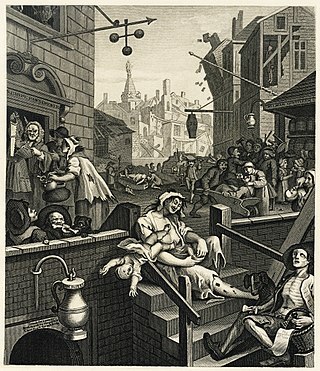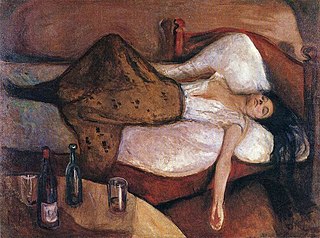Dutch courage, also known as pot-valiance or liquid courage, refers to courage gained from intoxication with alcohol. [1]
Dutch courage, also known as pot-valiance or liquid courage, refers to courage gained from intoxication with alcohol. [1]
Alcohol is occasionally used by criminals as a tool to commit alcohol-related offenses. These may include alcohol-facilitated sexual assaults, drunk driving, thefts (for example motor vehicle thefts), or alcohol-fueled robberies and violent crimes. However, Dutch courage defense is not a valid intoxication defense.
Consuming alcohol prior to visiting female sex workers is a common practice among some men. [2] Also, sex workers often resort to using drugs and alcohol to cope with stress. However, female sex workers in low- and middle-income countries have high rates of harmful alcohol use, which is associated with increased risk of unprotected sex and sexually transmitted infections. [3]

Alcohol has a long association of military use, and has been called "liquid courage" for its role in preparing troops for battle. It has also been used to anaesthetize injured soldiers, celebrate military victories, and cope with the emotions of defeat.
Military and veteran populations face significant challenges in addressing the co-occurrence of PTSD and alcohol use disorder. While existing interventions show promise, more research is needed to evaluate their effectiveness for this specific population, and new tailored interventions should be developed and evaluated to better meet their unique needs. [4]
The popular story dates the etymology of the term Dutch courage to English soldiers fighting in the Anglo-Dutch Wars [5] (1652–1674) and perhaps as early as the Thirty Years' War (1618–1648). One version states that jenever (or Dutch gin) was used by English soldiers for its calming effects before battle, and for its purported warming properties on the body in cold weather. Another version has it that English soldiers noted the bravery-inducing effects of jenever on Dutch soldiers. [6] [7]
Gin is a Dutch invention, and was first distilled in Holland in the 16th century. The flavouring in gin comes from juniper berries. The Dutch word for 'juniper' is 'jenever', which got Anglicised to 'ginever' and then finally to 'gin'. [7] Gin would go on to become popular in Britain thanks to King William III of England (William of Orange, r. 1689–1702), who was also Stadtholder of the Netherlands.

Alcoholism is the continued drinking of alcohol despite it causing problems. Some definitions require evidence of dependence and withdrawal. Problematic use of alcohol has been mentioned in the earliest historical records. The World Health Organization (WHO) estimated there were 283 million people with alcohol use disorders worldwide as of 2016. The term alcoholism was first coined in 1852, but alcoholism and alcoholic are stigmatizing and discourage seeking treatment, so clinical diagnostic terms such as alcohol use disorder or alcohol dependence are used instead.

Alcohol intoxication, also known in overdose as alcohol poisoning, commonly described as drunkenness or inebriation, is the behavior and physical effects caused by a recent consumption of alcohol. In addition to the toxicity of ethanol, the main psychoactive component of alcoholic beverages, other physiological symptoms may arise from the activity of acetaldehyde, a metabolite of alcohol. These effects may not arise until hours after ingestion and may contribute to the condition colloquially known as a hangover. The term intoxication is commonly used when large amount of alcohol is consumed along with physical symptoms and deleterious health effects.

Gin is a distilled alcoholic drink flavoured with juniper berries and other botanical ingredients.
Post-traumatic stress disorder (PTSD) is a mental and behavioral disorder that develops from experiencing a traumatic event, such as sexual assault, warfare, traffic collisions, child abuse, domestic violence, or other threats on a person's life or well-being. Symptoms may include disturbing thoughts, feelings, or dreams related to the events, mental or physical distress to trauma-related cues, attempts to avoid trauma-related cues, alterations in the way a person thinks and feels, and an increase in the fight-or-flight response. These symptoms last for more than a month after the event. Young children are less likely to show distress, but instead may express their memories through play. A person with PTSD is at a higher risk of suicide and intentional self-harm.

Substance abuse, also known as drug abuse, is the use of a drug in amounts or by methods that are harmful to the individual or others. It is a form of substance-related disorder. Differing definitions of drug abuse are used in public health, medical, and criminal justice contexts. In some cases, criminal or anti-social behavior occurs when the person is under the influence of a drug, and long-term personality changes in individuals may also occur. In addition to possible physical, social, and psychological harm, the use of some drugs may also lead to criminal penalties, although these vary widely depending on the local jurisdiction.

Alcohol abuse encompasses a spectrum of alcohol-related substance abuse, ranging from the consumption of more than 2 drinks per day on average for men, or more than 1 drink per day on average for women, to binge drinking or alcohol use disorder.

Jenever, also known as Hollands, genever, genièvre, peket, or sometimes as Dutch gin, is the juniper-flavoured traditional liquor in the Netherlands, Belgium and adjoining areas in northern France and northwestern Germany. As an EU and UK Protected Designation of Origin the use of the term jenever and its soundalikes can only be used if the product is made according to the specifications in Belgium, the Netherlands, two northern French departments and two German federal states. Gin was developed in Britain after introduction of jenever to the island.

Liquor is an alcoholic drink produced by the distillation of grains, fruits, vegetables, or sugar that have already gone through alcoholic fermentation. Other terms for liquor include: spirit, distilled beverage, booze, spirituous liquor or hard liquor. The distillation process concentrates the liquid to increase its alcohol by volume. As liquors contain significantly more alcohol (ethanol) than other alcoholic drinks, they are considered "harder." In North America, the term hard liquor is sometimes used to distinguish distilled alcoholic drinks from non-distilled ones, whereas the term spirits is more commonly used in the UK. Some examples of liquors include vodka, rum, gin, and tequila. Liquors are often aged in barrels, such as for the production of brandy and whiskey, or are infused with flavorings to form flavored liquors, such as absinthe.

The Gin Craze was a period in the first half of the 18th century when the consumption of gin increased rapidly in Great Britain, especially in London. Daniel Defoe commented: "the Distillers have found out a way to hit the palate of the Poor, by their new fashion'd compound Waters called Geneva, so that the common People seem not to value the French-brandy as usual, and even not to desire it".
Alcohol has a number of effects on health. Short-term effects of alcohol consumption include intoxication and dehydration. Long-term effects of alcohol include changes in the metabolism of the liver and brain, several types of cancer and alcohol use disorder. Alcohol intoxication affects the brain, causing slurred speech, clumsiness, and delayed reflexes. There is an increased risk of developing an alcohol use disorder for teenagers while their brain is still developing. Adolescents who drink have a higher probability of injury including death.
Men's health is a state of complete physical, mental, and social well-being, as experienced by men, and not merely the absence of disease. Differences in men's health compared to women's can be attributed to biological factors, behavioural factors, and social factors.
An addictive behavior is a behavior, or a stimulus related to a behavior, that is both rewarding and reinforcing, and is associated with the development of an addiction. There are two main forms of addiction: substance use disorders and behavioral addiction. The parallels and distinctions between behavioral addictions and other compulsive behavior disorders like bulimia nervosa and obsessive-compulsive disorder (OCD) are still being researched by behavioral scientists.

The given name Juniper is either in reference to the English common name for the juniper tree or berry, or in reference to a derivation of the Welsh name Guinevere. Juniper has historically been used as both a boys' name and a girls' name.

A hangover is the experience of various unpleasant physiological and psychological effects usually following the consumption of alcohol, such as wine, beer, and liquor. Hangovers can last for several hours or for more than 24 hours. Typical symptoms of a hangover may include headache, drowsiness, concentration problems, dry mouth, dizziness, fatigue, gastrointestinal distress, absence of hunger, light sensitivity, depression, sweating, hyper-excitability, irritability, and anxiety.
Prolonged exposure therapy (PE) is a form of behavior therapy and cognitive behavioral therapy designed to treat post-traumatic stress disorder. It is characterized by two main treatment procedures – imaginal and in vivo exposures. Imaginal exposure is repeated 'on-purpose' retelling of the trauma memory. In vivo exposure is gradually confronting situations, places, and things that are reminders of the trauma or feel dangerous. Additional procedures include processing of the trauma memory and breathing retraining.

Binge drinking, or heavy episodic drinking, is drinking alcoholic beverages with an intention of becoming intoxicated by heavy consumption of alcohol over a short period of time, but definitions vary considerably.

Alcohol and sex deals with the effects of the consumption of alcohol on sexual behavior. The effects of alcohol are balanced between its suppressive effects on sexual physiology, which will decrease sexual activity, and its suppression of sexual inhibitions.
Drunkorexia is a colloquialism for anorexia or bulimia combined with an alcohol use disorder. The term is generally used to denote the utilization of extreme weight control methods to compensate for planned binge drinking. Research on the combination of an eating disorder and binge drinking has primarily focused on college-aged women, though the phenomenon has also been noted among young men. Studies suggest that individuals engage in this combination of self-imposed malnutrition and binge drinking to avoid weight gain from alcohol, to save money for purchasing alcohol, and to facilitate alcohol intoxication.

Alcohol, sometimes referred to by the chemical name ethanol, is a depressant drug found in fermented beverages such as beer, wine, and distilled spirit — in particular, rectified spirit. Ethanol is colloquially referred to as "alcohol" because it is the most prevalent alcohol in alcoholic beverages, but technically all alcoholic beverages contain several types of psychoactive alcohols, that are categorized as primary, secondary, or tertiary; Primary, and secondary alcohols, are oxidized to aldehydes, and ketones, respectively, while tertiary alcohols are generally resistant to oxidation; Ethanol is a primary alcohol that has unpleasant actions in the body, many of which are mediated by its toxic metabolite acetaldehyde. Less prevalent alcohols found in alcoholic beverages, are secondary, and tertiary alcohols. For example, the tertiary alcohol 2M2B which is up to 50 times more potent than ethanol and found in trace quantities in alcoholic beverages, has been synthesized and used as a designer drug. Alcoholic beverages are sometimes laced with toxic alcohols, such as methanol and isopropyl alcohol. A mild, brief exposure to isopropyl alcohol is unlikely to cause any serious harm, but many methanol poisoning incidents have occurred through history, since methanol is lethal even in small quantities, as little as 10–15 milliliters. Ethanol is used to treat methanol and ethylene glycol toxicity.

Use of mind-altering substances in warfare has included drugs used for both relaxation and stimulation. Historically, drug use was often sanctioned and encouraged by militaries through including alcohol and tobacco in troop rations. Stimulants like cocaine and amphetamines were widely used in both World Wars to increase alertness and suppress appetite. Drug use can negatively affect combat readiness and reduce the performance of troops. Drug use also poses additional expenses to the health care systems of militaries.